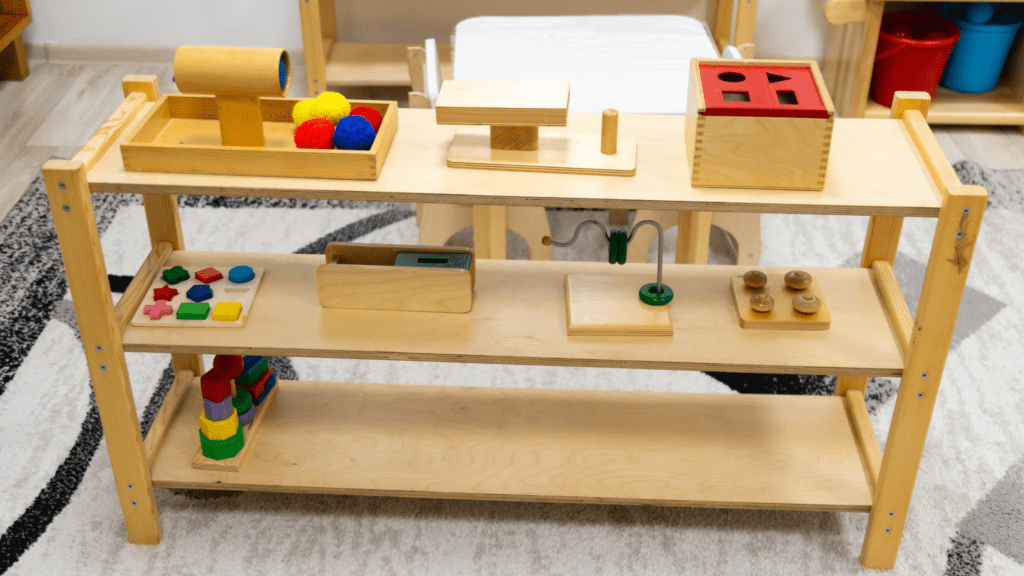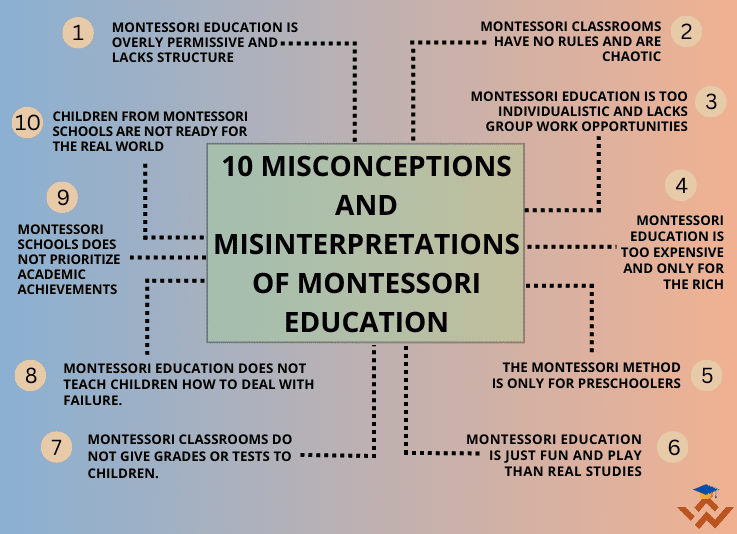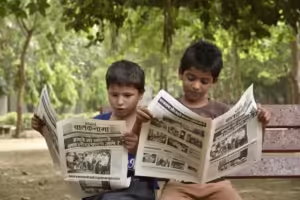The rise of Montessori schools in India is a testament to the changing educational landscape in the country. This innovative approach to education has been around for over a century and has been gaining popularity in recent years, as parents and educators alike seek out an alternative to traditional schooling. However, it also has its fair share of critics who make statements that are not necessarily true. In this article, we will be discussing 10 Montessori criticisms that are not true and why they should not be taken seriously. We will look at the common misconceptions about Montessori education and discuss why these criticisms are unfounded. We will also explore how Montessori can actually benefit children in their development and how it can help them reach their full potential.
10 Misconceptions and Misinterpretations of Montessori Education
Criticism #1: Montessori Education is Overly Permissive and Lacks Structure.
Critics of Montessori education claim that it is too permissive and lacks structure. However, this view is incorrect. Although Montessori education emphasizes freedom and independence, it is not permissive. Montessori education is highly structured and organized, with clear guidelines for behavior and a well-planned curriculum that is designed to meet each child’s developmental needs.
In Montessori classrooms, freedom and independence are balanced with structure and discipline. Students can choose their own work and work at their own pace, but they must follow rules and routines. Montessori teachers provide guidance and support to help students develop self-discipline and respect.
The Montessori curriculum is carefully designed to meet each child’s developmental needs. Teachers observe students and provide individualized instruction and guidance. They use different materials and activities to engage students and help them understand concepts.
Criticism #2: Montessori Classrooms have no Rules and are Chaotic
Montessori education is a child-centered approach to learning that emphasizes independence and freedom without limitations. While a Montessori classroom may appear chaotic to an outsider, this atmosphere has been intentionally created by educators to meet the developmental needs of the children. Children are free to move and explore their interests within boundaries established by the educators. The idea is that when children have the freedom to discover their interests, they become more motivated to learn and concentrate. This concept reinforces the fundamental Montessori principle of freedom within boundaries.
Montessori classrooms are often bustling with activity and noise, which represents productive and purposeful learning. Students are actively engaged in inquiry-based learning projects, sharing their interests and insights. Instead of sitting at desks all day, children move around and work together to learn, allowing them to collaborate and learn from one another. Additionally, this active learning environment allows children to use the space and learning tools that best match their individual learning styles, whether that involves handling classroom materials, reading about them, taking notes, or making sketches.
Criticism #3: Montessori Education is Too Individualistic and Lacks Group Work Opportunities
Another Montessori Criticism is that it is too focused on individual learning and does not provide enough opportunities for group work and collaboration. However, this is also a misconception. While Montessori education does emphasize individual learning, it also provides many opportunities for group work and collaboration, as well as opportunities for children to learn from and help each other.
Also read, how to setup Montessori Environment at Home?
Criticism #4: Montessori Education is too Expensive and Only for the Rich
One of the key criticisms leveled against Montessori education is that it can be prohibitively expensive, making it only accessible to the wealthy. However, it is important to note that there are many different types of Montessori schools, and not all of them are exorbitantly priced. While it is true that some Montessori schools can be quite expensive, there are also many public Montessori schools and Montessori-inspired programs that are much more affordable and accessible to families of all income levels.
Moreover, Montessori education provides long-term benefits for children. Although it may cost more than other educational systems, the emphasis on personalized learning and exploration can enhance a child’s creativity, problem-solving skills, and independence, leading to future success. Research has shown that Montessori-educated children often have higher levels of creativity, problem-solving skills, and independence than their peers educated in more traditional systems.
Lastly, it is worth noting that the benefits of Montessori education are not limited to the classroom. Many Montessori principles can also be applied at home, allowing parents to create a nurturing and supportive environment for their children’s learning and growth. By providing opportunities at home for self-directed play, allowing children to make their own choices, and cultivating a love of learning through exploration and discovery, we can encourage children to love learning.
Criticism #5: The Montessori Method is only for Preschoolers
One of the most common Montessori Criticisms is that it is only suitable for preschool-aged children. However, this is a misconception. While Montessori education did originate as a method for teaching young children, it has since been adapted for all ages, from infancy through adolescence.
Research has shown that Montessori education is highly effective for children of all ages. Its emphasis on personalized learning and hands-on exploration is also beneficial for children who may struggle in more traditional educational settings. Furthermore, the emphasis on self-directed learning and independence can help children develop important life skills that will serve them well throughout their academic and professional careers.
Criticism #6: Montessori Education is Just Fun and Play than Real Studies
Some argue that Montessori education is too focused on play and not enough on real studies. However, this is a misinterpretation of Montessori education, which actually emphasizes hands-on, experiential learning that is highly effective in promoting academic concepts.
The emphasis on play is not meant to detract from academics, but rather to enhance them. Children learn best when they are engaged in enjoyable and interesting activities. Research has shown that play-based learning can be just as effective, if not more so, than traditional classroom instruction.
Moreover, Montessori education does not neglect academics entirely. Students are still taught reading, writing, math, science, social studies, and other important subjects. However, the approach is different; instead of being lectured to and memorizing information, students are encouraged to explore and discover concepts on their own, with guidance from their teacher. This approach fosters critical thinking and creativity, skills that are essential for success in the 21st century.
While Montessori education may be criticized for its emphasis on play, it is important to understand that this is not at the expense of academic rigor. Play-based learning can be highly effective in promoting academic concepts, while also promoting critical thinking and creativity.
Criticism #7: Montessori Classrooms do not Give Grades or Tests to Children.
Montessori classrooms prioritize each child’s individual progress and development rather than giving traditional grades or tests. Despite assumptions that Montessori students lack experience with testing or perform poorly on standardized tests, research shows the opposite to be true. Montessori education focuses on improving the skills required to learn a particular topic. After mastering a skill, students move on to the next, more complex skill. This approach emphasizes learning through experience and practice.
Teachers carefully observe and evaluate each child’s progress through various methods, including observation, student work, and individual conferences with students and parents. This allows for personalized instruction and support to help each child reach their full potential. By emphasizing the learning process over the end result, Montessori education encourages children to become lifelong learners who are motivated by their own curiosity and love of learning.
It should be noted that many Montessori schools offer test preparation programs to ensure students are prepared to succeed in secondary school. The reason for not focusing on traditional grades is to avoid teaching students to learn solely for the sake of a grade. Instead, the goal is to foster a love of learning that will motivate students throughout their lives.
Also Check: What are the Long-term Benefits of Montessori Education for Children and Adults?
Criticism #8: Montessori Education does not Teach Children How to Deal with Failure.
One common criticism of Montessori education is that it does not adequately prepare children for the challenges they may face in traditional schools. Specifically, critics claim that Montessori does not teach children how to deal with failure. While it is true that Montessori education does not place as much emphasis on grades and testing as traditional schools do, this does not mean that Montessori students are not learning how to deal with failure.
Montessori education provides many opportunities for children to learn from their mistakes and take responsibility for their own learning. In a Montessori classroom, children are encouraged to work independently and at their own pace, which allows them to make mistakes and learn from them without the pressure of being graded or compared to their peers. This provides them with valuable skills, such as problem-solving, critical thinking, and self-motivation, which are essential for success in any educational setting, including traditional schools. The classroom is also designed with self-correcting materials, so children can learn from their mistakes without a teacher’s intervention.
Criticism #9: Montessori Schools Does not Prioritize Academic Achievements
One criticism of Montessori education is that it does not prioritize academic achievement. While this is a common misconception, it is important to note that Montessori education has been shown to be highly effective in promoting academic achievement. This is because children are encouraged to learn at their own pace and follow their own interests, leading to a deeper understanding and appreciation of the material.
In fact, numerous studies have been conducted to evaluate the academic outcomes of Montessori education. These studies have consistently shown that Montessori school children outperform those from traditional schools in a variety of subjects, including math, science, and language arts. Additionally, Montessori students often develop strong problem-solving skills, critical thinking abilities, and a love for learning that lasts throughout their academic careers.
Criticism #10: Children from Montessori Schools are not Ready for the Real World
One of the concerns people have about Montessori education is that it may not prepare children for the “real world.” However, it’s important to note that Montessori education focuses on developing life skills that are essential for success in any career or life path. Montessori schools strongly encourage self-discipline, self-motivation, and independence, all of which can help children thrive in the real world. By fostering these traits from an early age, Montessori schools are giving children the tools they need to succeed and make a positive impact on their communities.
Montessori education is not just about academics. Unlike traditional schools that focus only on academic achievement, Montessori schools aim to create well-rounded individuals with strong intellectual, emotional, and social intelligence. Montessori education encourages children to develop a deep sense of empathy and compassion, which is essential for creating a better world. By fostering a love of learning and a commitment to making a difference, Montessori education prepares children for a lifetime of success and fulfillment.
In addition, Montessori education provides children with a strong foundation in critical thinking, problem-solving, and creativity. These skills are highly valued in many industries and are essential for success in the 21st century.
To Conclude
Although Montessori education may face criticisms, it is important to distinguish facts from fiction and understand the genuine nature and benefits of this highly respected approach. The Montessori technique is quite complex, with many moving elements, which may lead to confusion among prospective families. However, each classroom’s curriculum and the planning of each school day for each child are meticulously planned. With such a long and well-documented history as an educational concept, it is understandable that some misconceptions may arise. With its holistic approach to education, it’s no wonder that more and more parents in India are turning to Montessori schools for their child’s education.
FAQs on Montessori Criticism
- What is the biggest criticism of Montessori?
The biggest criticism of Montessori education is that it lacks standardized assessment and grading systems, which some argue can make it challenging to measure a student’s progress or prepare them for traditional grading systems used in conventional schools.




